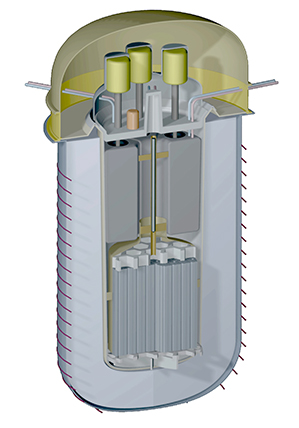Advanced Nuclear Startup Terrestrial Energy Lands Initial Funding
One of the most promising developers of advanced nuclear power plants, the Canadian startup Terrestrial Energy, has landed $7 million in funding. Although the investment is small, it is an important signal that the private sector might back innovative nuclear reactors as the search for low- or no-carbon forms of power generation accelerates.

More than $1.3 billion in private capital has been invested in North American companies working on advanced nuclear reactor technologies, according to Third Way, a Washington, D.C.-based think tank. But much of that money has gone to companies pursuing nuclear fusion, which is in a far earlier stage than technologies that employ fission, the conventional form of nuclear power (see “Finally, Fusion Takes Small Steps Toward Reality”).
In addition to the money Terrestrial Energy has raised from undisclosed investors, Transatomic Power, a nuclear startup founded by a pair of MIT PhDs, has raised $6.3 million from investors including Peter Thiel’s Founders Fund. Nevertheless, many new nuclear startups are still scrambling to fund their research and development programs. Terrestrial’s funding is “good news for everyone,” says Transatomic founder Leslie Dewan, “because it provides market validation for the sector as a whole.”
Terrestrial was founded by David LeBlanc, a former professor at Ottawa’s Carleton University and an expert in molten-salt reactor technology. That design, first developed in the 1960s at Oak Ridge National Laboratory, uses a molten fluid as both fuel and coolant, making it essentially meltdown-proof and, in theory, much less expensive to build than today’s reactors.
The funding comes two months after the White House held a nuclear energy summit at which the U.S. Department of Energy announced a program to help facilitate and finance innovation in nuclear power, called the Gateway for Accelerated Innovation in Nuclear (GAIN). The program was created to overcome regulatory and institutional barriers to getting unconventional reactor designs approved by the Nuclear Regulatory Commission and built in the United States (see “White House Strikes a Blow for Advanced Nuclear Reactors”).
Terrestrial Energy, however, is hoping to first win regulatory approval in Canada, CEO Simon Irish says, and plans to commission its first commercial power plant in the 2020s. He adds, “That’s important because if you’re part of the 2030s, in terms of climate change, you’re not going to make too much of a difference. We can’t wait an extra decade to bring new nuclear plants online; we have to start now.”
Keep Reading
Most Popular
Large language models can do jaw-dropping things. But nobody knows exactly why.
And that's a problem. Figuring it out is one of the biggest scientific puzzles of our time and a crucial step towards controlling more powerful future models.
How scientists traced a mysterious covid case back to six toilets
When wastewater surveillance turns into a hunt for a single infected individual, the ethics get tricky.
The problem with plug-in hybrids? Their drivers.
Plug-in hybrids are often sold as a transition to EVs, but new data from Europe shows we’re still underestimating the emissions they produce.
Google DeepMind’s new generative model makes Super Mario–like games from scratch
Genie learns how to control games by watching hours and hours of video. It could help train next-gen robots too.
Stay connected
Get the latest updates from
MIT Technology Review
Discover special offers, top stories, upcoming events, and more.